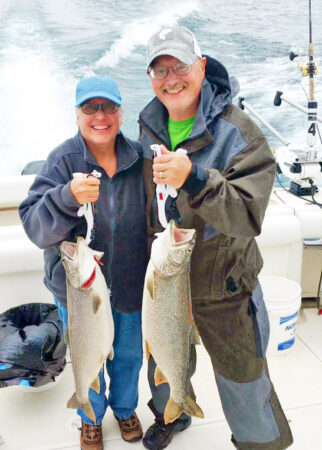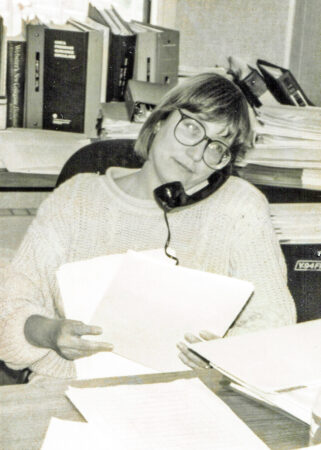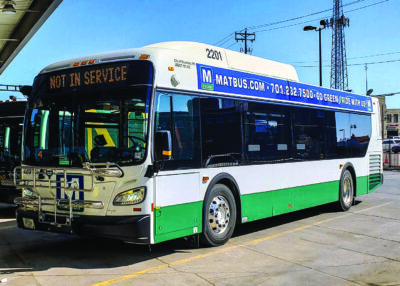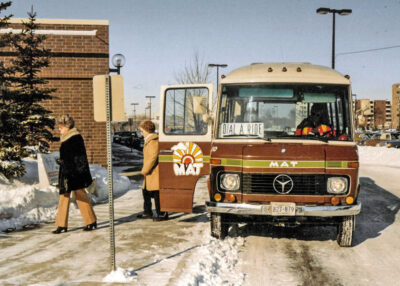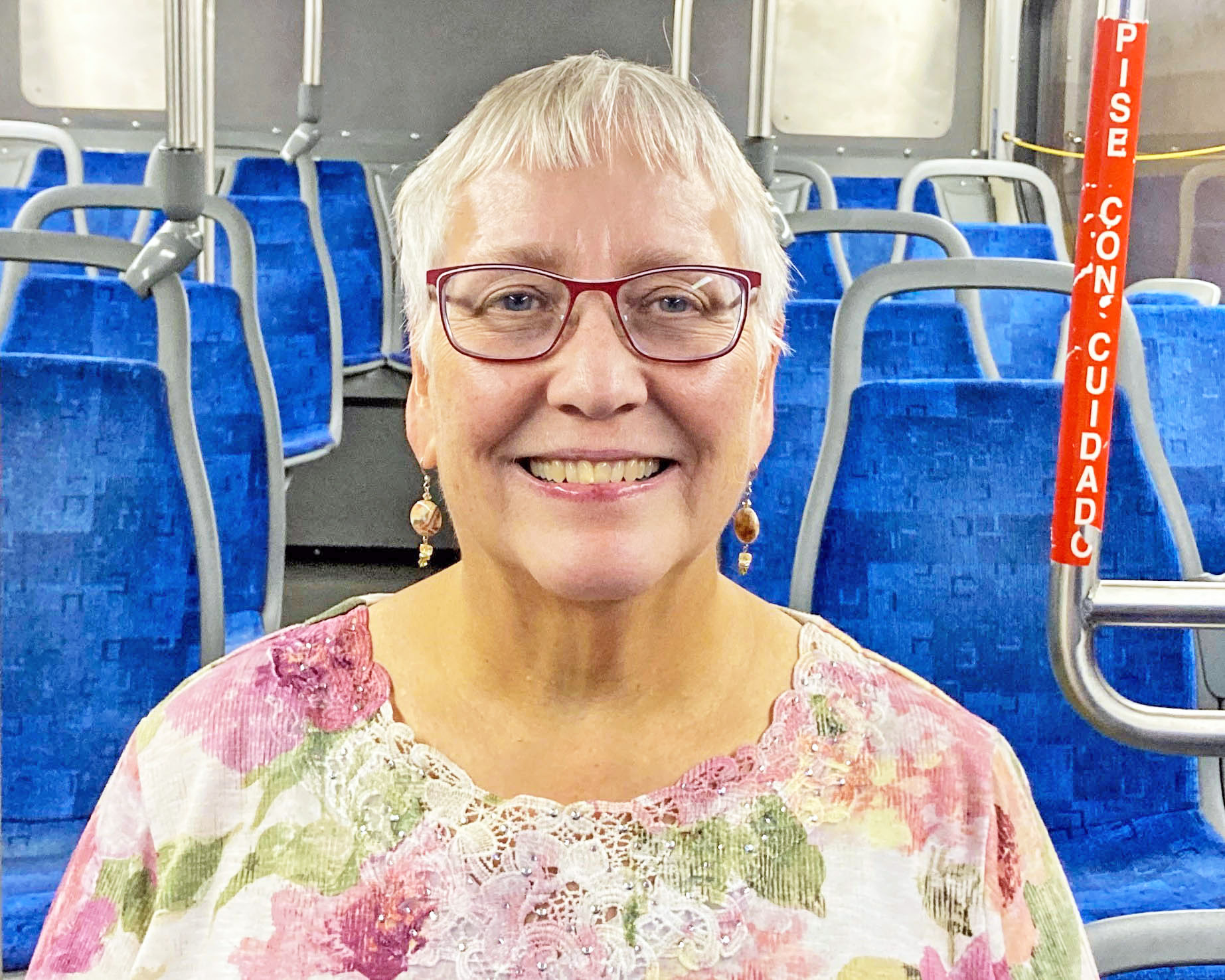- Lori Van Beek looks forward to more fishing with her husband Mark in days to come.
- Lori Van Beek was named transit director in 1990.
- New Flyer bus at Center Mall, 2022.
- Moorhead’s Dial-a-Ride was using Mercedes buses like this one in 1987, when Lori Van Beek became transit director.
Nancy Edmonds Hanson
It’s been a long, long ride. But after 42 years, Lori Van Beek will soon be getting off MATBUS.
“I’ve been involved with transportation in one way or another since I got my first job with the city in 1982,” the Moorhead transit manager reflects. “It’s been a great ride.”
Lori joined the city’s planning, community development and transit department shortly after graduating from M State. For the past 34 years, she has managed public transportation in Moorhead – first as an independent operation, and later as a partner in the community-wide Metropolitan Area Transportation system. Along with her Fargo counterpart, Julie Bommelman, she now oversees a system that operates 23 fixed routes between Fargo, Moorhead, Dilworth and West Fargo. MATBUS also coordinates with Paratransit for people with disabilities and Metro Senior Ride, a program of Valley Senior Services.
The communities’ sleek, ad-emblazoned buses provided 1.3 million rides in 2023 – down from the peak of 1.8 million in 2018, but recovering from the work-at-home blow delivered by the COVID pandemic. Its passengers range from mothers with small children to college students, from workers headed to and from their jobs to retired folks not inclined to drive, along with people who simply want the convenience – and the economy – of leaving the car in their garage.
The smooth-running system criss-crossing the community was in its formative years when Lori was named Moorhead’s transit manager in 1990. It’s an evolution that has never slowed, as technology and political changes have carried the essential public service far beyond its modest roots. “We’ve gone from horse-drawn wagons to electric street cars to fueled buses, and now electric,” she observes.
“The buses were operated by private companies until 1971, when voters in both Fargo and Moorhead approved using property taxes to subsidize transit services.” But the systems operated separately, contracting with two private firms to serve their cities. There were bumps in the road. For awhile, there was no transfer point across the river. Instead, Moorhead passengers had to walk five blocks and cross a bridge to transfer to Fargo routes.
Those days, of course, are long gone. As MATBUS’s unofficial historian, Lori has enjoyed piecing together the story of local public transportation, starting with those wagons in 1882. Sitting in her office in the jointly owned Metro Transit Garage, she looks back: “I had just graduated. City Hall was almost brand new. Morrie Lanning was in his first term as mayor. I used city government’s very first computer, an IBM Displaywriter. City Hall was almost brand new.”
By the time she took over managing the city’s transit operations, Fargo and Moorhead were well on their way to a coordinated community-wide transportation system. The Ground Transportation Center had been built on Fargo’s NP Avenue. Crosstown transfer fees had been eliminated. But it would take almost two decades longer before Metropolitan Area Transit joined the two systems into one, with Moorhead owning one-third and Fargo two-thirds of their common operation.
Now, Lori and her Fargo counterpart head separate operations but typically move forward as a team. Hiring and managing drivers is contracted out to a private company, Transdev. The two administrators each head their own city’s program, including grants, funding and management of routes within its borders. They collaborate on operating policies, fare structures and other administrative duties.
That will change next year. The cities have agreed that Fargo will take over management of the entire system, with Moorhead purchasing services according to a complex cost-allocation plan based on hours of service in the city. The shift was spurred by the 2020 census, causing the communities to be reclassified from “small urban area” to “large urban area.” That change reduces, rather than grows, the amount of federal funding that’s available to supplement the operating budget. Other sources include fares, state and city funds, and modest revenue generated by those big bus-sized advertisements on the vehicles’ sides.
The move, too, coincides with Lori’s departure Dec. 27. When she ends her tenure with the city, Lori will be one of its longest-serving employees. “We’re not really sure about that,” she laughs. “Larry Anderson or Scott Hutchins may have been here longer. But I do think I hold that title right now.”
Lori’s colleagues in public transportation honored her service this year with the Minnesota Public Transit Association’s District Career Award. “That’s been a fun part of this job,” she says. “Everybody shares their experience and their knowledge. It’s a nice community of people who really care about their riders.”
Lori has new journeys in mind as she prepares to step away from the buses. “After working for so many hours, I’m looking forward to cleaning my house,” she laughs. “I want to volunteer, maybe with the Emergency Food Pantry or the library.” And she wants to do more fishing with her husband, Mark Van Beek, who retired in May after 25 years as a city arborist: “He’s waiting for me to have some fun.”
It has been a sometimes-amazing journey for the woman who grew up riding the bus with her mother, who didn’t drive. “We did take the bus downtown from our home on the north side,” the Fargo North High grad says. “We could have walked, I know, but we liked riding better. When I got this job, I knew all about how many people didn’t drive.”
Those people – the ones who depend on MATBUS to carry on their lives – are what Lori says she will remember most fondly: “The best part of this job? The people on the bus.” She gotten to know them while riding along on random routes, hearing their stories and seeing how public transportation is an essential part of their lives.
“People tell me, ‘Oh, taking the bus is so expensive,’” she says. “But that’s not true at all … not compared to all your car costs you.”


